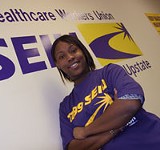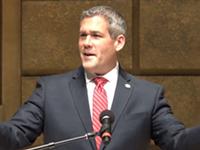[
{
"name": "500x250 Ad",
"insertPoint": "5",
"component": "15667920",
"parentWrapperClass": "",
"requiredCountToDisplay": "1"
}
]
At the University of Rochester this past weekend, the atmosphere was festive, as the UR inaugurated its new president, Joel Seligman. But some University employees didn't have their minds on celebration; contract negotiations between management and two unions, SEIU Local 1199 and 200 United, have stalled, and several hundred union members were picketing.
The unions represent about 1,200 of the university's lowest-paid full-time workers, primarily patient-care technicians, surgical assistants, secretaries, drivers, janitors, and food servers. The university has offered current employees an annual wage increase of 2 percent for the next two years, but it wants to hold down wages for new employees by spreading scheduled increases over a longer period. It also wants to limit its contribution to employee health-insurance costs.
In a recent interview with City, Seligman suggested that growth at the UR'sMedicalCenter could boost the local economy. That growth could attract highly paid professional workers, but the UR's current labor conflict highlights the needs of another sector of the Rochester population: low-wage workers and the unemployed. Will the UR's growth benefit them as well?
On average, the workers make about $24,000 a year. "Keep in mind, we're talking about the working poor," says SEIU Local Vice President Bruce Popper, "people who are living paycheck to paycheck, most of them from the 19th Ward," right across the river from the University.
MedicalCenter spokesperson Teri D'Agostino says the Center's wages are comparable for similar positions regionally and nationally. In addition, says D'Agostino, the university offers scholarships to employees to study nursing, and, along with the union, contributes to a fund for training that can lead to a degree.
Among the workers on the picket line last week was Devery Reid-Holmes. Immediately likeable, Reid-Holmes is the kind of person you'd want to see coming into your hospital room. She's one of a group of union workers whom patients see more often than many other hospital staff, because she deals with so many of their needs. In fact, patients often mistake her for a nurse rather than a much-lower-paid patient-care technician.
Reid-Holmes, who also provides for her 3-year-old daughter Imani, stepped out of the picket line on Friday to talk about her work and why she was there.
We come in, and one of the first things we do is get the patient's vitals done: make sure everything is okay with them. See how they are doing. How they slept that night. Then we get them fed, cleaned, and bathed. Sometimes we dress them. They may need traction set up. We do everything for them except we don't administer drugs, hook up the IV's --- and we can't do [surgical] pin care. I'm in orthopedics, so many of the patients have just had surgery, and we can't do the pins.
I started out working in the kitchen. I've been here at the hospital for two years and eight months, and I've been in this position for a year. If you had asked me a few years ago if I would ever do something like this, I would have said no. I never even thought about it. I wanted to be an elementary teacher, because I love working with kids. But I really love doing this.
I like being around people and helping them. A big part of my job is making them feel comfortable in spite of the situation. Nobody wakes up and says, "I want to be in the hospital today." Some of them are in pain, and they can be a little worried and anxious.
We don't usually deal with people who are very sick in the sense that they have a terminal illness. They are here because they are usually having hip, knee, back, or neck surgery. We do a lot of back surgeries. And they are pretty uncomfortable at first. So it makes me feel good when they call out and say, "Send Devery in here."
When they ask for you by name it's nice, because it means that you have established a bit of trust with them, and they are getting used to being here. They feel free to talk with you and tell you what they need. They're getting better. Sometimes they will come back a couple of months later and say hello, and it's nice, especially when you can hardly tell they were even here in the first place. They are up and moving around like normal.
There's really nothing I don't like about the job. I know when I tell people what I do, the first thing they think is: You clean people's butts for a living. But you really don't do that much of that. It's not about that. I mean, sometimes people need a lot of help. They can't feed themselves. They can't sit up right. And yeah, sometimes they need help cleaning themselves. But it's not a big deal. I don't think it's bad. It means a lot to them. I mean when you can't even do that yourself, you're pretty grateful. So I don't mind it.
I'm out here because the benefits are really important to me. I have my daughter to think about, and if they do what they say they're gonna do, I've looked at those numbers, and I would be working just to pay for health insurance. Nothin' else. And I can't do that.
This is the first time that I have ever done anything like this. Before this job I worked in a Kentucky Fried Chicken, and this is a whole lot better than that. But at the same time, I don't feel guilty. I'm not afraid. I don't feel like I am doing something wrong by being out here.
I hope they [management] understand that. I feel we contribute in a very important way. We are on the front lines with the patients. We do a lot of things that need to be done in a place like this. You don't think the doctors are going to pass trays or the nurses are going to sweep the floors, do you? It would never happen.
And the union helps, because a lot of decisions are made by people who often don't look at you as if you have certain needs from the job, too. And that you should be treated with respect because what you are doing is important, too. A lot of decisions are made behind closed doors without any input from you. So it helps to have someone support you. There are people that have been here for 30 and 40 years. And most of us have families or kids to take care of, so we can't afford to lose benefits or pay more for them.
I just think that management gets so much more out of workers who love their jobs and can't wait to come to work in the morning. It's important to make a profit, but so is investing in your employees. They're good people, and I hope it works out.
Speaking of...
Latest in News
More by Tim Louis Macaluso
-

RCSD financial crisis builds
Sep 23, 2019 -

RCSD facing spending concerns
Sep 20, 2019 -

Education forum tomorrow night for downtown residents
Sep 17, 2019 - More »









